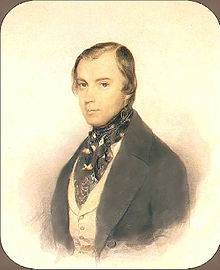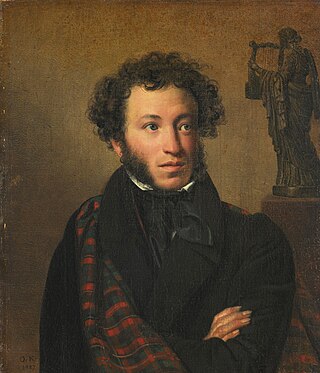
Alexander Sergeyevich Pushkin was a Russian poet, playwright, and novelist of the Romantic era. He is considered by many to be the greatest Russian poet, as well as the founder of modern Russian literature.

Osip Emilyevich Mandelstam was a Russian and Soviet poet. He was one of the foremost members of the Acmeist school.

Russian literature refers to the literature of Russia, its émigrés, and to Russian-language literature. Major contributors to Russian literature, as well as English for instance, are authors of different ethnic origins, including bilingual writers, such as Kyrgyz novelist Chinghiz Aitmatov. At the same time, Russian-language literature does not include works by authors from the Russian Federation who write exclusively or primarily in the native languages of the indigenous non-Russian ethnic groups in Russia, thus the famous Dagestani poet Rasul Gamzatov is omitted.
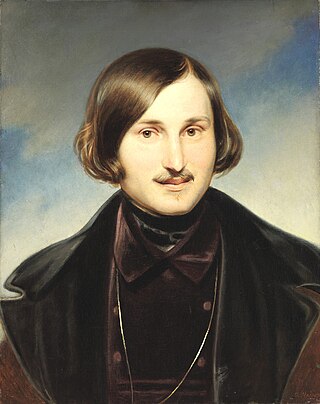
Nikolai Vasilyevich Gogol was a Russian novelist, short story writer, and playwright of Ukrainian origin.
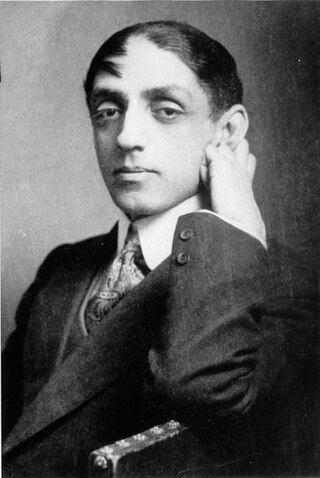
Mikhail Alekseevich Kuzmin was a Russian poet, musician and novelist, a prominent contributor to the Silver Age of Russian Poetry.

Iosif Aleksandrovich Brodsky was a Russian and American poet and essayist. Born in Leningrad in the Soviet Union, Brodsky ran afoul of Soviet authorities and was expelled from the Soviet Union in 1972, settling in the United States with the help of W. H. Auden and other supporters. He taught thereafter at Mount Holyoke College, and at universities including Yale, Columbia, Cambridge, and Michigan. Brodsky was awarded the 1987 Nobel Prize in Literature "for an all-embracing authorship, imbued with clarity of thought and poetic intensity". He was appointed United States Poet Laureate in 1991.
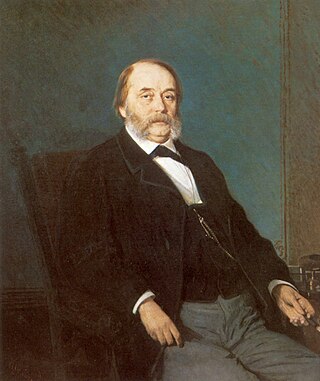
Ivan Aleksandrovich Goncharov was a Russian novelist best known for his novels The Same Old Story, Oblomov (1859), and The Precipice. He also served in many official capacities, including the position of censor.

Vladimir Ivanovich Dal was a Russian lexicographer, speaker of many languages, Turkologist, and founding member of the Russian Geographical Society. During his lifetime he compiled and documented the oral history of the region that was later published in Russian and became part of modern folklore.

Yury Karlovich Olesha was a Russian and Soviet novelist. He is considered one of the greatest Russian novelists of the 20th century, one of the few to have succeeded in writing works of lasting artistic value despite the stifling censorship of the era. His works are delicate balancing acts that superficially send pro-Communist messages but reveal far greater subtlety and richness upon a deeper reading. Sometimes, he is grouped with his friends Ilf and Petrov, Isaac Babel, and Sigismund Krzhizhanovsky into the Odessa School of Writers.

Sergey Timofeyevich Aksakov was a 19th-century Russian literary figure remembered for his semi-autobiographical tales of family life, as well as his books on hunting and fishing.

Tomas Venclova is a Lithuanian poet, prose writer, scholar, philologist and translator of literature. He is one of the five founding members of the Lithuanian Helsinki Group. In 1977, following his dissident activities, he was forced to emigrate and was deprived of his Soviet citizenship. Since 1980, he has taught Russian and Polish literature at Yale University. Considered a major figure in world literature, he has received many awards, including the Prize of Two Nations, and The Person of Tolerance of the Year Award from the Sugihara Foundation, among other honors.

Veniamin Aleksandrovich Kaverin was a Soviet and Russian writer, dramatist and screenwriter associated with the early 1920s movement of the Serapion Brothers.

Denis Ivanovich Fonvizin was a playwright and writer of the Russian Enlightenment, one of the founders of literary comedy in Russia. His main works are two satirical comedies—including Young ignoramus, which mocks contemporary Russian gentry—and are still staged today.
Mirgorod is a collection of short stories written by Nikolai Gogol, composed between 1832 and 1834 and first published in 1835. It was significantly revised and expanded by Gogol for an 1842 edition of his complete works. The title Mirgorod is the Russian pronunciation of the name of the Ukrainian city Myrhorod and means "city of peace" in both languages. It is also the setting for the final story in the collection, “The Tale of How Ivan Ivanovich Quarreled with Ivan Nikiforovich”. The title reflects the stories’ portrayal of provincial Ukrainian life, similar to Gogol’s successful previous collection, Evenings on a Farm Near Dikanka. To solidify this connection between the two works, he attached the subtitle: “Stories which are a continuation of the Evenings on a Farm Near Dikanka.”

Vera Fyodorovna Panova was a Soviet and Russian writer, novelist and playwright. She was a recipient of the Stalin Prize in 1947, 1948, and 1950.
Osip is a Russian male given name, a variant of the name Joseph. Notable people with the name include:
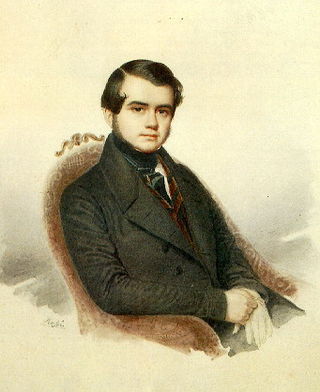
Count Vladimir Alexandrovich Sollogub was a minor Russian writer, author of novelettes, essays, plays, and memoirs.

Maria Sergeyevna Petrovykh was a Russian poet and translator.

Poor Folk, sometimes translated as Poor People, is the first novel by Fyodor Dostoevsky, written over the span of nine months between 1844 and 1845. Dostoevsky was in financial difficulty because of his extravagant lifestyle and his developing gambling addiction; although he had produced some translations of foreign novels, they had little success, and he decided to write a novel of his own to try to raise funds.
Elizaveta Nikolayevna Akhmatova writing as Leila was a Russian writer, publisher and translator who published translations of English and French writers into Russian.
